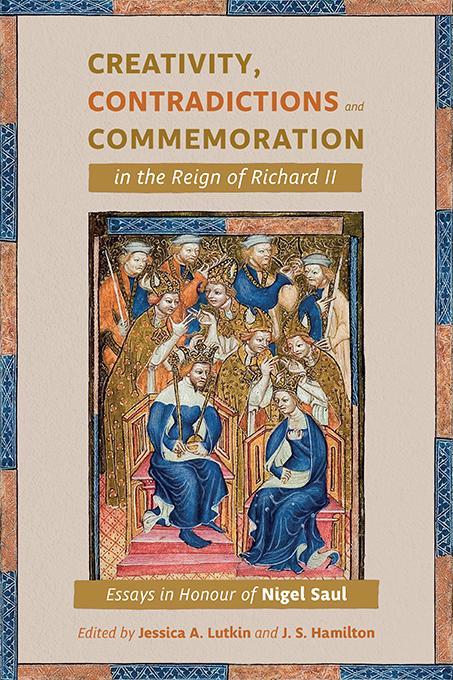 Creativity, Contradictions and Commemoration in the Reign of Richard II
Creativity, Contradictions and Commemoration in the Reign of Richard II 8 - John of Gaunt, Richard II, and Plantagenet Family Politics in the 1390s
Published online by Cambridge University Press: 26 May 2022
Summary
The reign of Richard II continues to provoke debate amongst students of late-medieval politics, especially for its seemingly limitless capacity for drama. Nowhere is that drama more in evidence than in Richard's last years, a tumultuous thirty months that proved to be the turning point of the reign. That conclusion is not one invented by modern historians but is supported by evidence available in the records of government and also by contemporary writers such as Thomas Walsingham, the St Albans’ chronicler who was Richard's most prominent contemporary critic. Walsingham described the king's behaviour in the months between the January Parliament of 1397 and his eventual deposition as ‘tyrannical’. For their part, a number of modern historians have since adopted Walsingham's assessment: Caroline Barron's influential 1973 essay on the subject and Nigel Saul's royal biography are very much cases in point. More recently, a surge of interest in the reign has yielded a somewhat less emphatic interpretation for the events that unfolded in those dramatic final months. Notable among these is the work of Christopher Fletcher, who has considered Richard's kingship through the twin lenses of manhood and masculinity. Fletcher argues forcefully that Richard was saddled with a bevy of images suggesting adolescence well into adulthood, weakening his rule and remaining a consistent political problem throughout his reign. For Fletcher, Richard could never quite liberate himself from the persona of the Boy King who had been so thoroughly invested with the hopes of the nation following the deaths of his father and grandfather – though he fought mightily to do so. This problem made the affronts levelled against him in the Merciless Parliament and the persecution of his friends more than simply blows struck against the royal dignity; they amounted to a kind of violence against his manhood, as well. In weaving this tale of adolescence, his enemies were able to point to his relative reticence in martial pursuits (reinforced by his preference for peace with the French), and to his failure to produce an heir. And while it is unlikely that conceptions of masculinity played a decisive role in his downfall, Fletcher certainly makes a compelling case that opposition to Richard's rule was driven by more than disagreements over royal policy.
- Type
- Chapter
- Information
- Creativity, Contradictions and Commemoration in the Reign of Richard IIEssays in Honour of Nigel Saul, pp. 149 - 178Publisher: Boydell & BrewerPrint publication year: 2022


